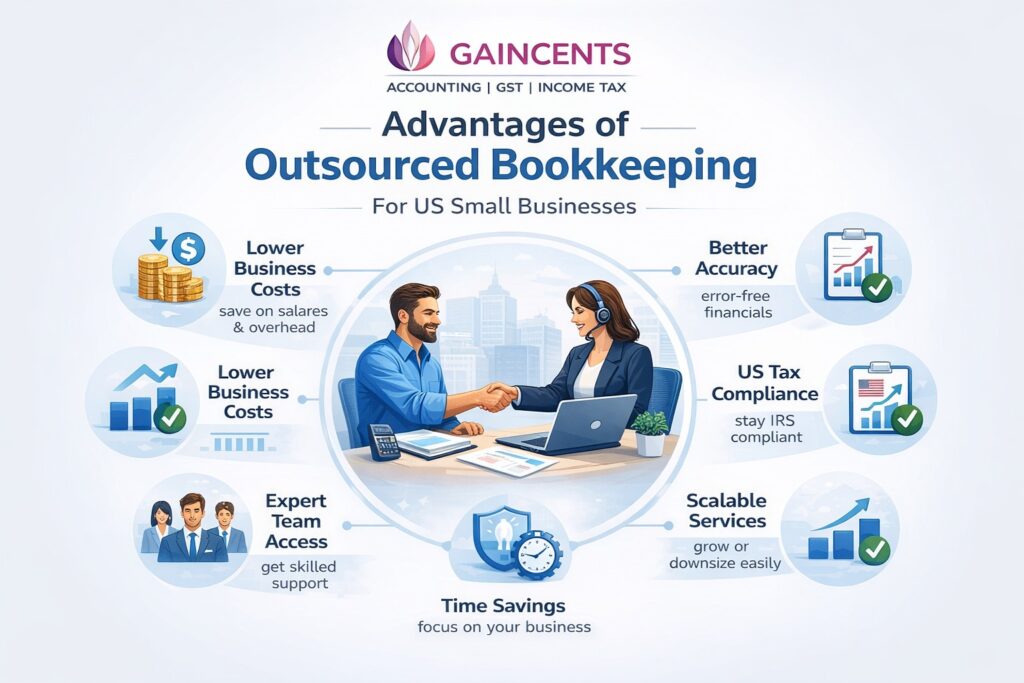Why US Small Businesses Are Switching to Outsourced Bookkeeping in 2026

In 2026, US small businesses are rethinking how they manage their finances. With rising operating costs, complex tax regulations, and increased reliance on digital tools, many business owners are moving away from traditional in-house bookkeeping. Instead, they are choosing outsourced bookkeeping services to gain accuracy, efficiency, and cost control—without sacrificing financial visibility.
What Is Outsourced Bookkeeping?
Outsourced bookkeeping is the practice of hiring an external professional firm to manage a business’s day-to-day financial records. This includes recording transactions, reconciling bank accounts, managing accounts payable and receivable, and preparing financial reports. It allows US businesses to maintain accurate books without hiring in-house accounting staff.
- Professional bookkeeping without full-time hiring costs
- Accurate, up-to-date financial records year-round
- Scalable support as business needs grow
- Improved compliance and financial visibility
Greater Focus on Core Business Functions
- More Time for Growth: Business owners focus on strategy, sales, and expansion
- Reduced Administrative Burden: No need to manage daily accounting tasks
- Improved Productivity: Teams concentrate on revenue-generating activities
- Faster Decision-Making: Clear financial data available without manual effort
Technology and Automation Adoption
Outsourced bookkeeping firms use advanced cloud-based tools to automate financial processes, reduce manual errors, and provide real-time access to business data.
Tools Commonly Used:
- QuickBooks Online: Automated transaction tracking and reporting
- Xero: Cloud accounting with real-time financial visibility
- Bill.com: Streamlined accounts payable and receivable management
- Hubdoc: Automated document capture and expense management

Advantages of Outsourced Bookkeeping
- Lower Business Costs: Outsourced bookkeeping removes expenses related to full-time salaries, employee benefits, office space, training, and accounting software for US small businesses.
- Improved Accuracy: Professional bookkeepers follow standardized processes to ensure error-free records, accurate reconciliations, and reliable financial reports.
- US Tax Compliance Support: Experienced teams help maintain compliance with federal and state tax requirements, reducing the risk of IRS penalties or missed deadlines.
- Scalable Services: Bookkeeping support can be increased or reduced based on business growth, seasonal workloads, or changing financial needs.
- Time Savings for Owners: Business owners can focus on operations, sales, and growth instead of managing day-to-day accounting tasks.
- Access to a Skilled Team: Businesses gain support from multiple bookkeeping professionals rather than relying on a single in-house employee.
- Better Financial Visibility: Regular reports and real-time data help business owners make informed decisions with confidence..
Frequently Asked Questions
- Is outsourced bookkeeping legal in the United States?
Yes. Outsourced bookkeeping is fully legal in the US when provided by professional firms that follow IRS regulations, accounting standards, and data security best practices. - How does outsourced bookkeeping help reduce business costs?
Outsourced bookkeeping eliminates expenses for full-time salaries, employee benefits, training, office space, and software while offering professional services at a predictable monthly cost. - Will I lose control over my financial data if I outsource?
No. You maintain complete ownership and full access to your financial records through secure cloud-based accounting platforms with real-time visibility. - Is outsourced bookkeeping secure for US businesses?
Yes. Trusted providers use encrypted systems, secure servers, role-based access controls, and regular backups to protect sensitive financial data. - What bookkeeping tasks are typically outsourced?
Outsourced bookkeeping includes transaction recording, bank reconciliations, managing accounts payable and receivable, payroll support, expense tracking, and monthly financial reporting. - Can Gaincents outsourced bookkeeping service work with my CPA or tax advisor?
Yes. Gaincents collaborates closely with your CPA or tax advisor to ensure accurate records, smooth tax preparation, and efficient year-round financial coordination.
